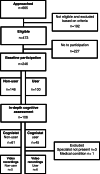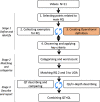"What should I do when I get home?" treatment plan discussion at discharge between specialist physicians and older in-patients: mixed method study
- PMID: 33143713
- PMCID: PMC7607876
- DOI: 10.1186/s12913-020-05860-9
"What should I do when I get home?" treatment plan discussion at discharge between specialist physicians and older in-patients: mixed method study
Abstract
Background: During discharge from hospital, older patients and physicians discuss the plan for managing patients' health at home. If not followed at home, it can result in poor medication management, readmissions, or other adverse events. Comorbidities, polypharmacy and cognitive impairment may create challenges for older patients. We assessed discharge conversations between older in-patients and physicians for treatment plan activities and medication information, with emphasis on the role of cognitive function in the ongoing conversation.
Methods: We collected 11 videos of discharge consultations, medication lists, and self-reported demographic information from hospitalised patients ≥65 years at the Geriatric department in a general hospital. Mini Mental State Examination score < 25 was classified as low cognitive function. We used microanalysis of face-to-face dialogue to identify and characterise sequences of interaction focused on and distinguishing the treatment plan activities discussed. In addition to descriptive statistics, we used a paired-sample t-test and Mann-Whitney U test for non-parametric data.
Results: Patients' median age was 85 (range: 71-90);7 were females and 4 males. Median of 17 (range: 7 to 23) treatment plan activities were discussed. The proportions of the activities, grouped from a patient perspective, were: 0.40 my medications, 0.21 something the hospital will do for me, 0.18 someone I visit away from home, 0.12 daily routine and 0.09 someone coming to my home. Patients spoke less (mean 190.9 words, SD 133.9) during treatment plan activities compared to other topics (mean 759 words, SD 480.4), (p = .001). Patients used on average 9.2 (SD 3.1) medications; during the conversations, an average of 4.5 (SD 3.3) were discussed, and side effects discussed on average 1.2 (SD 2.1) times. During treatment plan discussions, patients with lower cognitive function were less responsive and spoke less (mean 116.5 words, SD 40.9), compared to patients with normal cognition (mean 233.4 words, SD 152.4), (p = .089).
Conclusion: Physicians and geriatric patients discuss many activities during discharge conversations, mostly focusing on medication use without stating side effects. Cognitive function might play a role in how older patients respond. These results may be useful for an intervention to improve communication between physicians and older hospitalised patients.
Keywords: Clinical communication; Discharge; Elderly; Medication use; Physicians.
Conflict of interest statement
CL has participated on an advisory board and received payment for lectures arranged by Abbvie Pharma AS and Roche AS, Norway. He has also received research sponsorship from Abbvie Pharma. All other authors declare having no conflicts of interest.
Figures
Similar articles
-
Cooperation between geriatricians and general practitioners for improved pharmacotherapy in home-dwelling elderly people receiving polypharmacy - the COOP Study: study protocol for a cluster randomised controlled trial.Trials. 2017 Apr 4;18(1):158. doi: 10.1186/s13063-017-1900-0. Trials. 2017. PMID: 28372591 Free PMC article. Clinical Trial.
-
Effect of Clinical Geriatric Assessments and Collaborative Medication Reviews by Geriatrician and Family Physician for Improving Health-Related Quality of Life in Home-Dwelling Older Patients Receiving Polypharmacy: A Cluster Randomized Clinical Trial.JAMA Intern Med. 2020 Feb 1;180(2):181-189. doi: 10.1001/jamainternmed.2019.5096. JAMA Intern Med. 2020. PMID: 31617562 Free PMC article. Clinical Trial.
-
Polypharmacy and medication regimen complexity as factors associated with hospital discharge destination among older people: a prospective cohort study.Drugs Aging. 2014 Aug;31(8):623-30. doi: 10.1007/s40266-014-0185-1. Drugs Aging. 2014. PMID: 24862100
-
Family involvement in managing medications of older patients across transitions of care: a systematic review.BMC Geriatr. 2019 Mar 29;19(1):95. doi: 10.1186/s12877-019-1102-6. BMC Geriatr. 2019. PMID: 30925899 Free PMC article.
-
Managing Polypharmacy in Older Adults with Cancer Across Different Healthcare Settings.Drug Healthc Patient Saf. 2021 Apr 29;13:101-116. doi: 10.2147/DHPS.S255893. eCollection 2021. Drug Healthc Patient Saf. 2021. PMID: 33953612 Free PMC article. Review.
Cited by
-
The Challenges and Value of Using Video-Assisted Education Tools and Digital Information Systems for Post-discharge Care in Elderly Patients: A Scoping Review.Cureus. 2025 Jun 18;17(6):e86319. doi: 10.7759/cureus.86319. eCollection 2025 Jun. Cureus. 2025. PMID: 40688829 Free PMC article. Review.
-
Brief Intervention as a Method to Reduce Z-Hypnotic Use by Older Adults: Feasibility Case Series.JMIR Form Res. 2024 Feb 8;8:e51862. doi: 10.2196/51862. JMIR Form Res. 2024. PMID: 38329779 Free PMC article.
-
Knowledge, attitudes and practices among patients with end-stage kidney disease towards hyperkalaemia management in Shenzhen, China: a cross-sectional study.BMJ Open. 2025 Mar 22;15(3):e092619. doi: 10.1136/bmjopen-2024-092619. BMJ Open. 2025. PMID: 40122543 Free PMC article.
-
The effect of cognitive function and central nervous system depressant use on mortality-A prospective observational study of previously hospitalised older patients.PLoS One. 2022 Mar 3;17(3):e0263024. doi: 10.1371/journal.pone.0263024. eCollection 2022. PLoS One. 2022. PMID: 35239678 Free PMC article.
-
Mortality and health-related quality of life in older adults with long-term use of opioids, z-hypnotics or benzodiazepines: a prospective observational study at 5 years follow-up.BMJ Open. 2024 Feb 21;14(2):e079347. doi: 10.1136/bmjopen-2023-079347. BMJ Open. 2024. PMID: 38387984 Free PMC article.
References
-
- Kripalani S, LeFevre F, Phillips CO, Williams MV, Basaviah P, Baker DW. Deficits in communication and information transfer between hospital-based and primary care physicians: implications for patient safety and continuity of care. JAMA. 2007;297(8):831–841. doi: 10.1001/jama.297.8.831. - DOI - PubMed
MeSH terms
Grants and funding
LinkOut - more resources
Full Text Sources
Medical



